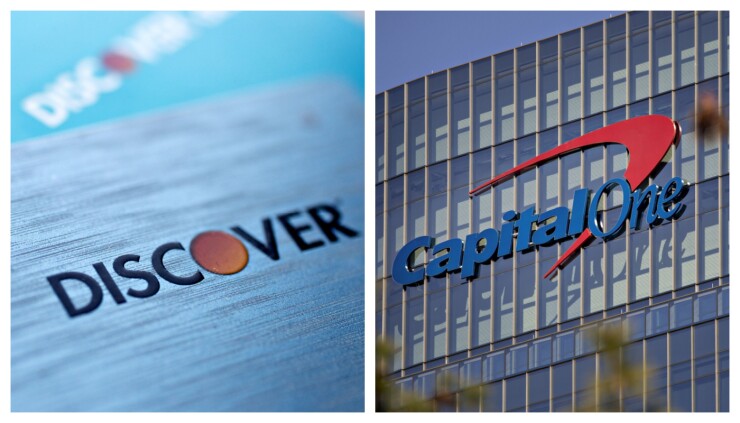
Capital One Financial has filed its application to acquire Discover Financial Services as the deal's opponents are digging in their heels, previewing what is likely to be a contentious review process that focuses on the merger's impact on competition.
The McLean, Virginia-based credit card giant formally submitted applications to federal regulators Wednesday night. The blockbuster $35 billion deal
Capital One laid out arguments that the acquisition should withstand antitrust scrutiny, and that it meets bank regulators' merger requirements, according to a source familiar with the matter. The regulators are expected to make the application publicly available soon.
The bank still expects the transaction to close by the end of this year or early 2025, the source said. Although federal agencies don't pre-approve mergers, the Office of the Comptroller of the Currency and the Federal Reserve would have already told the two banks if the proposed deal didn't meet basic regulatory criteria, according to the source.
The Capital One-Discover merger has drawn opposition from advocates for tough antitrust enforcement, including progressive politicians such as
After Capital One filed its merger application, a coalition of 30 organizations that oppose the deal
They asked the Fed and the OCC to prohibit a streamlined application process, extend the public comment period, host public hearings on the deal and publicly disclose the content of pre-filing meetings with Discover and Capital One.
The groups also asked the Department of Justice to evaluate the proposed merger under its 2023 guidelines, rather than its earlier guidelines, and to publish its competitive factors report.
Jesse Van Tol, president and CEO of the National Community Reinvestment Coalition, one of the organizations that signed the letter, said in a prepared statement that the proposed deal is "dangerous," and that public, in-person hearings would be "vital" to amplify community concerns to regulators.
"Although the quantifiable competitive harms from the deal are disqualifying on their own, we know that industry staff and lobbyists enjoy ready access to regulatory staff at all times," Van Tol said. "Community voices can have a harder time breaking through — which is why it's so important for the hearings process to help the millions of lower-income people from whom Capital One extracts its profits to be represented in this conversation."
Another group that signed onto the letter to regulators, the American Economic Liberties Project,
"We believe this deal is likely to face serious regulatory headwinds and is unlikely to be consummated," the report stated.
The American Economic Liberties Project's report also laid out the group's case for why merger should be rejected on antitrust grounds. One of its arguments is that Capital One is already the largest player in subprime credit card lending, with $47 billion of loans, and that if the Discover merger is approved, its position in that segment would become more dominant.
"With the addition of Discover's $20 billion in subprime card loans, Capital One would more than double those of JPMorgan Chase ($30 billion) and Citigroup ($33 billion), the next largest major bank subprime lenders," the report states.
Capital One's view is that the subprime credit card segment isn't a concentrated market, according to the source familiar with the matter.
The source made the same argument about the credit-card issuing market generally, and also noted that bank mergers are subject to different requirements than those in other industries.
If the deal is approved, Capital One would nab ownership of Discover's payment network. That network needs additional resources and card volumes to be a viable competitor against heavy hitters Visa, Mastercard and American Express, according to the source.
A key part of Capital One's argument to antitrust officials is that the acquisition will boost competition in the payments business by bolstering Discover as a rival to the larger networks.
Riverwoods, Illinois-based Discover has recently had to reckon with a spate of compliance lapses. Last year
On an investor call last month, Jeff Norris, senior vice president of finance at Capital One, said the bank would move its entire debit card business and a portion of its credit cards onto Discover's rails.
Norris also said that the bank would add more than 25 million cardholders and over $175 billion in purchase volume to the Discover network by 2027.
"This will be a step-change in the scale of the network and we will grow it from there," Norris said on the call. "This injection of volume and investment in the network will help Discover be competitive with the leading networks."
The Capital One-Discover deal presents a major test for the Biden administration, which has expressed more skepticism about large bank mergers than previous administrations.
On Thursday, the FDIC
The FDIC isn't one of the agencies that will render a verdict on the Capital One-Discover combination, but there were other signs Thursday of Washington's skepticism about the deal.
In a speech, Consumer Financial Protection Bureau Director Rohit Chopra lamented that banks have gotten much bigger and more complex in recent decades, and he called for additional reforms, including addressing the impact that mergers have on consumers.
Chopra also pointed to
Also on Thursday, a bipartisan Senate bill was introduced that its sponsors, Democratic Sen. Sheldon Whitehouse and Republican Sen. JD Vance, said would end tax-free mergers. In a press release, the lawmakers cited the Capital One-Discover merger as an example of the kind of deal they want to crack down on.
Ian Katz, a managing director at Capital Alpha Partners, wrote in a note Thursday that mergers among mid-sized to large banks will take longer in the current environment, but they aren't off the table.
"We lean slightly toward thinking the Capital One-Discover merger proposal eventually happens, though not this year," Katz wrote. "But that merger has an important payments element that makes it unlike most garden variety bank combinations."





